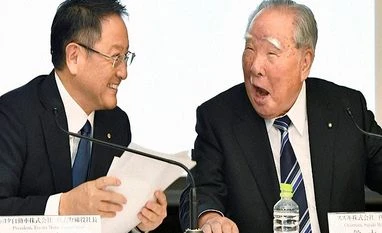Toyota and Suzuki are known to be fiercely protective of their independence and the announcement of their partnership has come as a surprise for the automobile industry.
Globally, car makers from different continents have tried to form partnerships, but most of these have resulted in failures.
Toyota and Suzuki, too, have tried joining hands with their western rivals in the past, but most of these partnerships perished before they could achieve their objectives. Toyota had a manufacturing joint venture with General Motors for the US market and more recently with electric mobility specialist Tesla. Both partnerships ended on a sour note.
Suzuki, on the other hand, was wooed by Volkswagen, Europe's biggest car maker whose ambition was to beat Toyota and become world number one. Volkswagen had 11 brands under its belt, many of which were luxury brands, but none were generating volumes as high as Suzuki.
Globally, car makers from different continents have tried to form partnerships, but most of these have resulted in failures.
Toyota and Suzuki, too, have tried joining hands with their western rivals in the past, but most of these partnerships perished before they could achieve their objectives. Toyota had a manufacturing joint venture with General Motors for the US market and more recently with electric mobility specialist Tesla. Both partnerships ended on a sour note.
Suzuki, on the other hand, was wooed by Volkswagen, Europe's biggest car maker whose ambition was to beat Toyota and become world number one. Volkswagen had 11 brands under its belt, many of which were luxury brands, but none were generating volumes as high as Suzuki.
ALSO READ: Toyota, Suzuki may drive together
India has seen its share of failed marriages among automobile makers, too. From Mercedes and Tata Motors, then Tata Engineering and Locomotive Co, joining hands to make trucks in the mid-1950s to the partnership of France's Renault with Mahindra & Mahindra in the late 2000s for the Logan sedan, the country has seen numerous break-ups.
Truck maker Ashok Leyland, which had no expertise in making cars, jumped into the market when Nissan offered an alliance for passenger vans. The venture was called off after the vans failed to attract customers.
Two-wheeler major Bajaj Auto tried its hand at making cars when Renault and Nissan invited it to form a joint venture. The trio initially set out to make a rival to Tata’s Nano that would be more efficient. The venture fell apart over the vehicle's positioning.
)